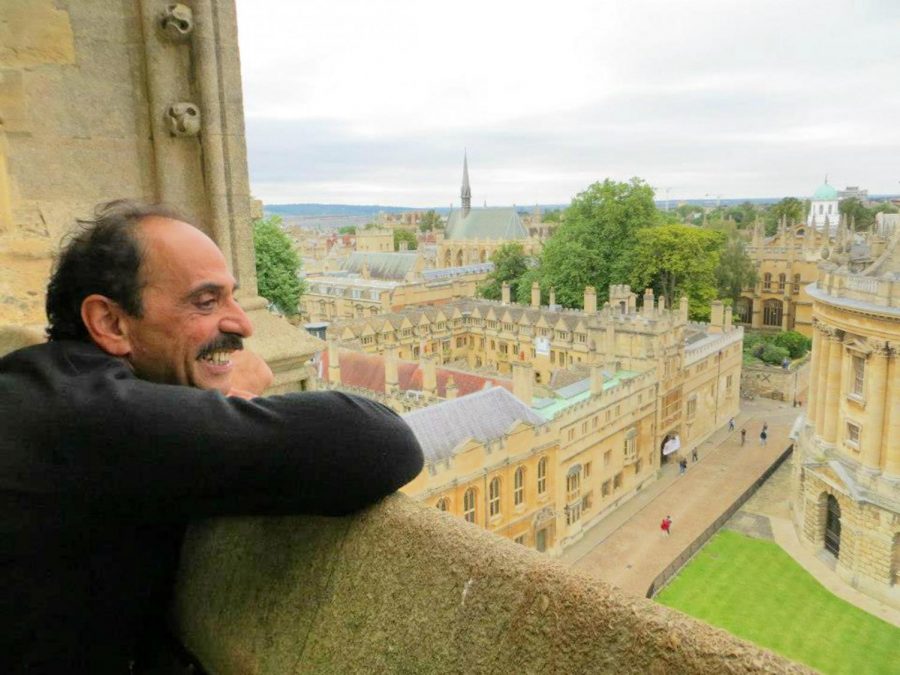Brint’s Oxford ‘legacy’ will live on
Uyeno-Tseng Professor of International Studies and Professor of Political Science Michael E. Brint is retiring at the end of the spring 2021 semester.
April 13, 2021
At the end of the spring 2021 semester, Uyeno-Tseng Professor of International Studies and Professor of Political Science Michael E. Brint will retire after his 20-year career at California Lutheran University. Brint has served as Cal Lutheran’s faculty director for the University of Oxford study abroad program since he established it using his longtime affiliation there in 2008.
“The Oxford Program was the best experience I’ve had as a professor,” Brint said in an email interview. “I had the opportunity to bring 150 Cal Lutheran students to Oxford and introduce them to the tutorial method of learning. I love Oxford and have been associated with it for well over 40 years so it was a real joy to welcome our students to a city I consider my second home.”
The Associate Provost for Global Engagement, Christina Sanchez, said in a phone interview that she and the Dean of the College of Arts and Sciences, Jessica Lavariega Monforti, determined that Peter Carlson, associate professor of Religion, would be the best candidate to serve as the faculty director of the program. Sanchez said his experience as a fellow at Lincoln College–one of the constituent colleges at Oxford–played a part in their decision.
“Dr. Carlson was in London, doing some research when Dean Lavariega and I went to Oxford. He came for two days to be with us for some of the discussions and the work to help in thinking through the conceptualization of the program,” Sanchez said. “It was very fortunate for us to have him there.”
Since the pandemic led to the cancellation of study abroad programs in fall 2020, Brint’s last Oxford cohort was not able to experience the trip as intended.
In a typical year, Brint was responsible for leading the program, which allowed students to study in England at one of the many Oxford colleges and then continue learning on a tour throughout Europe.
Brint said part of his decision to step away was to “allow new folks to take over” when he learned there would no longer be a travel portion of the program to Europe.
Rachel Johnson, senior and Oxford program alumna, said in a phone interview that she enjoyed her experience in Europe, along with talking to the numerous people in Brint’s network at Oxford and in London.
“He was really quite a leader. I don’t think I’ve encountered many other people who lead the way he does in this context. He is taking 12 students to Europe and they’re his responsibility. He definitely instills the sense that ‘we are here for you,’” Johnson said.
Brint said at the heart of the Oxford system is the tutorial method, which is a key part of what makes this program special as well as rigorous.
“It consists of [two to three] students meeting with their ‘tutor’ each week to discuss the works assigned from a rather extensive reading list,” Brint said.
While changes are being made to the program, keeping this instructional style is a crucial element that Sanchez said she is working on closely with Carlson and Brint.
“Moving forward, we want this to be a campus-wide opportunity for ongoing engagement but also for faculty to be able to work with students in all different academic disciplines,” Sanchez said. “Faculty in the future will be applying to express interest in being a leader and then they would be proposing a course that they would be teaching for the program and then we would select different faculty on an annual basis.”
The details of how the program will be alternating between different faculty directors in the coming years are still being planned, Sanchez said.
“The one thing that’s really important for the reenvisioning of the program is that it is not built for a specific faculty member. In the past, Dr. Brint was the only leader of the program. So [Carlson] is helping us with the transition year which is a huge assist because it is essentially building a new program, a new structural organization because we were so fortunate that Dr. Brint did it all,” Sanchez said.
Carlson said he is tasked with creating a sustainable framework for the program that allows for different professors to “hand it off.”
“My job is to make sure that over the next two years that we move into our new way of doing the program and that we’re established in it before we hand it off to another faculty member,” Carlson said in a Zoom interview.
Brint said that after he retires, he will likely continue to live part time in Europe and the United Kingdom with his wife and will miss the Oxford program.
“We love the South of France, particularly the small villages, so next year we will be heading to the Provence. Besides being on the road, we are dedicated to volunteer work,” Brint said. “I will miss working with our students and seeing them develop and grow as thinkers, travelers, and persons.”
Sanchez said the Oxford program is anticipated to run again this year and that they recently finished interviewing the next group of students who applied.
“[Brint] had such a strong mark on the institution, and this is a piece of his legacy that we certainly hope lives on,” Carlson said. “We hope this is a program that will remain strong and always be a tribute to his passion and dedication.”



